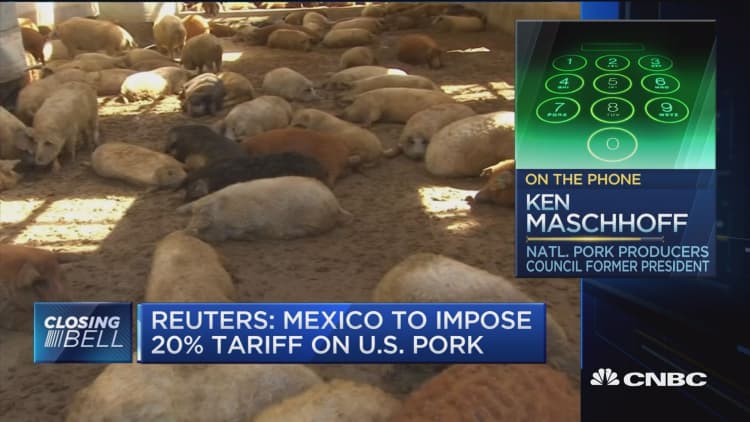American pork producers are bracing for pain ahead after confirmation Tuesday that Mexico will levy hefty tariffs up to 20 percent on U.S. pork in retaliation for the Trump administration's duties on Mexican steel and aluminum products.
But it might be good news for U.S. supermarket shoppers buying bacon, at least for a little while. Mexico's tariffs could lead to more pork supplies staying in the domestic market and lower consumer prices in the short term.
Mexico also announced tariffs on several other agricultural products, including apples, potatoes and cheese as well as on American bourbon. The tariffs will amount to between 15 percent to 25 percent.
Mexico's tariff on American pork applies to the animal's legs and shoulders. It also follows China slapping tariffs on U.S. pork earlier this year.
On Tuesday's news, July lean hog futures fell more than 2.3 percent on the Chicago Mercantile Exchange in early trading. The hog futures recouped some of the earlier losses but settled down 1.4 percent in the session.

"Producers are going to bleed a lot of red ink," said Ken Maschhoff, chairman of Maschhoff Family Foods and co-owner of the nation's largest family-owned pork producer. He said because the U.S. pork industry is "a low-cost producer of a high-quality product that's heavily dependent on trade, we've become the unintended victim here."
Added Maschhoff, "I'm not here to predict what impact it might have on the markets, but any time you get tariffs on a market that's as important as Mexico to us...it's not going to be good for pork producers. It's a terrible market disruption and bad timing"
The timing comes as the pork industry prepares for the busy grilling season during the summer months.
Bacon prices at supermarket could fall
The U.S. pork industry has been in the expansion mode in recent years, so industry executives say the impacts of new tariffs are amplified due to the increased supply coming on the market. They indicate that there could be lower consumer prices in the near term for pork, including bacon products.
That said, pork executives say the industry could pull back on supplies in the next year or two if trade-restricting barriers force producers to start losing significant amounts of money. If that downsizing happens, they say it could ultimately lead to higher prices in the long term for American consumers.
Mexico made an announcement last week about planned trade retaliation but didn't publish any details about it until Tuesday morning. The tariffs on unprocessed pork are 10 percent and effective Tuesday and grow to 20 percent on July 5.
"This is devastating to my family and pork producing families across the United States," said Jim Heimerl, a pork producer from Ohio and president of the National Pork Producers Council. "A 20 percent tariff eliminates our ability to compete effectively in Mexico."
Canada expected to impose new tariffs
Canada has also published a proposed retaliation list following the U.S. steel tariffs and it doesn't currently include pork but would impact American exports of prepared ready-to-eat beef products.
"Unfortunately, last week's announcement by the Mexican government about retaliatory duties on U.S. pork has now become official," Dan Halstrom, president and CEO of the U.S. Meat Export Federation, said in a statement Tuesday.
The U.S. exports about 27 percent of total pork production, according to USMEF. Mexico is the largest volume market for U.S. pork producers, representing about 25 percent of all pork shipments last year. In terms of value, the Mexico market ranks second to Japan.
Last year, more than 800,000 metric tons of American pork products shipped to Mexico, with a value of about $1.51 billion. U.S. pork exports to China in the same period were nearly $1.2 billion.
According to Halstrom, Mexico "has been a record-breaking mainstay market for U.S. pork, especially for U.S. hams, and its rapidly growing pork consumption is a critical driver of growth and profitability for the U.S. industry. USMEF is still working through the details of how these new tariffs will be administered, but this is a difficult situation we had hoped to avoid."
Mexico tariffs to 'negatively impact everyone'
Halstrom added that the Mexico tariffs on U.S. pork "will negatively impact everyone in the U.S. supply chain, place an unnecessary burden on Mexican consumers and potentially open up a tremendous strong market to a whole range of competitors."
Maschhoff noted that the U.S. pork industry already was feeling the impacts of China's 25 percent tariffs on U.S. pork imports, which Beijing put into place April 2. "That's been pretty costly to the industry," he said.
In early March, President Donald Trump unveiled a 25 percent duty on steel imports and 10 percent charge on aluminum imports. That led to China's finance ministry to slap retaliatory tariffs on up to 128 kinds of U.S. goods, including pork, nuts, wine and fruit.
China essentially tripled the tariff on U.S. pork this year in its tit-for-tat trade action against the United States. The standard Chinese tariff rate prior to the move was about 12 percent for most most frozen pork going into China, although they imposed an additional 25 percent duty in early April so the rate jumped from 12 percent to 37 percent.
Industry experts estimate that the Chinese tariffs alone represent around $18 per animal for a hog producers on an annualized basis, or a hit of more than $2 billion.
The Mexican and Chinese markets have been important to the U.S. pork industry because they have purchased product that Americans typically don't buy, including raw hams and what's called variety meats or organ meats.
Those products have historically been seen as adding value to the animal and helping producers in terms of profitability.
"The administration has asked us to be great patriots and loyal Americans through this process," Macshhoff said. "The pork producers, by in large, have not thrown rocks at anybody through this process. We realize that we're a small piece of bigger discussions."


